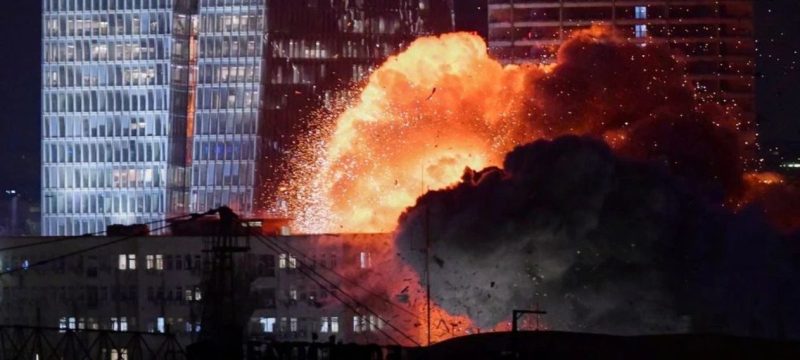On Saturday, Iran launched a new wave of ballistic and hypersonic missile attacks on Israel, marking the fifth phase of its ongoing retaliatory campaign, dubbed “True Promise 3.” The move significantly intensified tensions between the two long-standing adversaries.
According to Iranian and international media reports, the missile barrage targeted multiple Israeli cities, including Tel Aviv and Haifa. Residents reported loud explosions, while warning sirens rang out across northern regions of Israeli-occupied territories, urging people to seek immediate shelter.
Read more: Pakistan Condemns Israeli Strikes at UN, Reaffirms Support for Iran and Regional Stability
Iran’s state-run Mehr News Agency, citing Israeli sources, claimed a 50-storey building in Tel Aviv suffered severe structural damage. It further reported that numerous missiles and drones bypassed Israel’s advanced air defence systems, striking key infrastructure. Iranian officials warned that “no corner of Israel will remain safe” as the operation continues.
The Israeli Defence Forces (IDF) confirmed that its missile defence systems—such as the Iron Dome and David’s Sling—were activated to intercept the attacks. However, reports suggest that several Iranian projectiles successfully penetrated these defence layers and hit sensitive sites.
The missile strikes began late Thursday night and carried on into Friday morning. International outlets including AFP and Al Jazeera reported at least four Israeli fatalities, including one woman, and over 90 injuries. Emergency services in Tel Aviv said seven people suffered minor wounds. In response to the damage, Israeli authorities have imposed a ban on filming and sharing footage of the destruction.
In another claim, Iran’s Tasnim News Agency stated that Iranian air defences had shot down two Israeli warplanes and captured a female pilot. These reports have not been independently confirmed, and the IDF has yet to respond.
This latest strike follows Israel’s pre-dawn offensive on June 13, which targeted Iranian nuclear and military facilities and led to the deaths of several high-ranking officials, including Major General Mohammad Baqeri and IRGC commander Major General Hossein Salami. The attack also killed six nuclear scientists and at least 78 civilians, according to Iranian media, which included women and children.
Iran described the Israeli strike as the most extensive and coordinated assault on its territory in recent memory. Supreme Leader Ayatollah Ali Khamenei condemned the attack, warning that Israel had “sealed its bitter and painful fate” through its actions.
Amid the rising violence, international news agencies like CNN and Reuters have reported the exchange of hundreds of missiles between Iran and Israel in recent days, raising alarms about a possible broader conflict engulfing the Middle East.
Israeli police acknowledged that while some incoming missiles were intercepted, others caused widespread property damage in Tel Aviv and Haifa. Authorities confirmed four deaths and over 90 injuries, alongside significant destruction to residential areas.
Iran insists its missile strikes are retaliatory and aimed specifically at military and strategic sites within Israel, holding the country accountable for violating Iranian sovereignty and assassinating key national figures.
At the time of this report, neither the United Nations nor the United States had issued an official response. Meanwhile, security analysts continue to warn of a potential regional war if urgent diplomatic efforts are not undertaken.
In Israel, emergency meetings are underway within the government, and all major public events in key cities have been cancelled. Meanwhile, Iranian state media showed increased military preparedness, with defence systems mobilized across several provinces in anticipation of further conflict.









